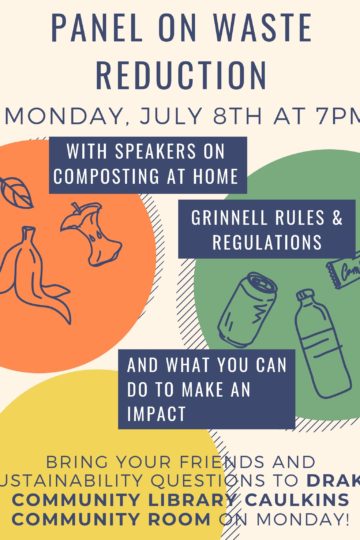July 24, 2019
On Monday, July 8th, a panel of waste reduction experts and enthusiasts came together at Drake Community Library to discuss composting. The event kicked off Imagine Grinnell’s Community Waste Reduction Speaker Series and became the official start of a conversation on what Grinnell can do to maintain its status as a sustainable and environmentally conscious town.
Residents discovered that composting can be simple; while a proper compost requires three parts “brown stuff” to one part “green stuff,” Tim Ellsworth, a certified composting enthusiast and one of our panelists, confessed to the audience that he puts anything compostable in his compost and it breaks down. He estimated that having a small compost pile in his backyard reduces his household food waste by at least 20%, and he’s probably right. According to the US EPA, about 30% of what we throw away in the United States is made up of compostable materials.
Self-sufficient composts such as Tim’s still reduce waste, but might not break down as quickly as a well-tended pile. An easy way to help compost break down faster is to maintain a proper ratio of brown and green material. The combination of carbon from the brown material and nitrogen from the green will allow the pile to reach about 120-170 degrees Fahrenheit: the perfect temperature for breaking down materials. Tommy Hexter, a founding member of Farm House at Grinnell College and another of our panelists, discussed his experience using red wiggler earthworms to break down materials in his compost. He suggested ordering worms from Uncle Jim’s Worm Farm, an online retailer of worms for composting. This type of compost is called a vermicompost and can be a great fit for small backyard composting.
Composting is an excellent form of waste reduction that can happen right in your backyard. But what about waste that can’t be composted? The third panelist was Tyler Avis, Director of Building & Planning for the City of Grinnell and an expert on city codes and regulations regarding waste disposal. He handed out chapter 105.04 of the Grinnell Code of Ordinances, and informed us that since the ability of the city to recycle is dependent on an inconsistent market, it is more sustainable and reliable to reduce waste rather than try to divert it. Our trash is transported to the South Central Iowa Solid Waste Agency, where almost 20% of our garbage is food waste. If every Grinnell resident composted, these 691 semi loads of food and yard waste could be prevented.
If these Grinnell residents can compost, so can you!






